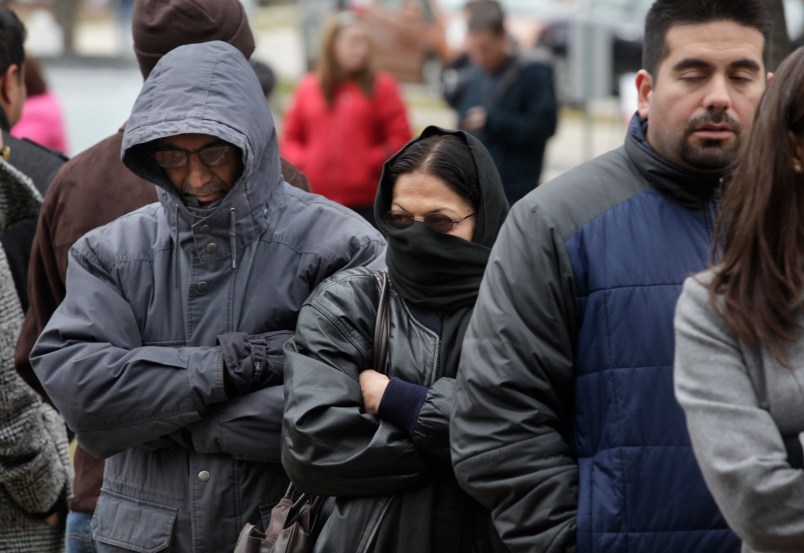Five years ago, North Carolina was making great strides in voter participation. More and more young, low-income, and minority voters were going to the polls. But in 2010, Republicans gained control of the legislature for the first time in a century, and rewrote district lines to ensure even more gains in 2012. Last summer North Carolina’s newly-elected general assembly, led by conservative Republicans, passed a comprehensive voter suppression law in a series of party-line votes, effectively turning back the clock on voting rights.
The seeds had been planted long before.
North Carolina’s conservative advocacy network, including Civitas and the John Locke Foundation, spent over five years calling for stricter voting laws. Civitas and John Locke both receive major funding from Art Pope, a wealthy businessman who is North Carolina’s local version of the Koch brothers. Since 2007, the network has published over 40 articles, news reports, and blog posts supporting an end to same-day registration, a smaller window for early voting, and a photo ID law.
Each plank in this platform appeared in the voter suppression law, and comes right out of the conservative playbook.
Many of these ideas for changing voting laws have appeared in a number of state legislatures, and for the most part the language comes from the Koch- and corporate-funded American Legislative Exchange Council (ALEC).
During a debate on the Senate floor, North Carolina State Senator Bob Rucho (R) claimed that the new law was about repealing laws that “game the system.” He had it exactly backwards. This bill actually games the system to help Republicans by making it harder for citizens to vote at all.
The new law essentially seeks to limit voter participation. For example, a bill signed into law by the governor last year ended North Carolina’s practice of out-of-precinct voting, which allowed citizens to vote in a neighboring district or ward.
As Dr. Rev. William Barber, the leader of the North Carolina’s State Conference of the NAACP points out, voting rights have come under fire before when the traditional establishment felt threatened.
Starting at the end of Reconstruction following the Civil War, North Carolina and other states used official and unofficial means to stop poor and black citizens from voting. North Carolina’s 1900 constitution required that voters pay a poll tax and be judged as literate by the local voter registrar, who could choose tough questions for some voters and easy questions – or none – for others. The constitution also included a grandfather clause that exempted from the poll tax those entitled to vote as of January 1, 1867. Between 1896 and 1904, nearly all black voters, including many thousands who had voted before, were removed from the voting rolls, and nearly all black officials were driven from office.
It took 70 years for the federal government to end these practices with the 24th Amendment to and the 1965 Voting Rights Act. But since the Supreme Court struck down in 2013 a crucial tenet of the Voting Rights Act, it has become all too easy for an extremely conservative legislature like North Carolina’s to roll out its voter suppression agenda.
Much like the voter suppression of a century ago, many elements in North Carolina’s new law will disproportionately hurt black and low-income voters.
According to Democracy NC, 29 percent of early voters and 34 percent of same-day registrants in 2012 were black. The new law cuts early voting by a week, and eliminates same-day registration altogether.
The North Carolina State Board of Elections found that over 300,000 voters who are already registered — and are disproportionately black and low-income — lack the type of photo ID that the new law requires. Ending Sunday voting means the end of the popular Souls to the Polls, a growing tradition in which black churchgoers go to vote together. Finally, the new law prohibits paying canvassers to conduct voter registration drives, which have often been organized to register low-income and minority voters.
The law is also firmly aligned with big money interests instead of the everyday voter. It weakened disclosure requirements for outside spending groups and increased the candidate donation maximum to $5,000. It also repealed public financing programs. Not only will it be easier for outside interests to influence candidates – if these outside groups can keep their spending hidden, it will be harder for the public to hold anyone accountable.
Instead of continuing North Carolina’s progress in making voting accessible and convenient to all voters, state lawmakers rolled back voting rights and restrict voter participation as much and as quickly as possible. Today, North Carolina Republicans control nearly supermajorities in both houses of the State Legislature, and the hold the governors’ office as well. Creating a new working majority in North Carolina that supports the right to vote may well take a generation of struggle.
Marion Johnson is a Master of Public candidate at Duke University and a Graduate Fellow for the Scholars Strategy Network.






